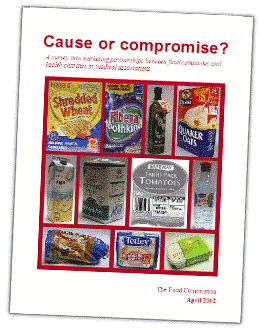
Cause or Compromise? Survey of marketing partnerships between food companies and health charities
99pp - 2002 | 2084Kb

Cause or Compromise? Survey of marketing partnerships between food companies and health charities
99pp - 2002 | 2084Kb
 Cause or Compromise? reports on a 2002 survey into marketing partnerships between food companies and health charities or medical associations.
Cause or Compromise? reports on a 2002 survey into marketing partnerships between food companies and health charities or medical associations.
Recent decades have seen a shift in consumer demand towards foods with an improved nutritional profile, in the interests of better health and the avoidance of disease. This has led food manufacturers to develop new products with added ‘functional’ ingredients that deliver, or claim to deliver, specific health benefits.
The shift in demand has also led to changes in the way food is described, both on the label and in associated marketing materials. Manufactured foods in many categories now carry health-related marketing phrases, from claims concerning nutrient content to claims that a food or drink can help to maintain health [EC: DG Sanco, 2001].
During a product survey conducted in support of the Cause or Compromise? study, health-related descriptions were observed on products as diverse as tinned spaghetti, margarine, cereals, jelly sweets, tinned fish, fruit, squash, bread, tea bags, processed cheese and chocolate. Some descriptions highlighted the presence of a particular nutrient, such as calcium; others carried claims for the benefits for particular organs of the human body, or for disease risk reduction, which would follow the consumption of the food on a regular basis.
To stand out amid this plethora of claims for the health benefits of food products, endorsements (and apparent endorsements) may be used by food marketers, potentially adding weight and authority to the claims. Thus, heart-health claims on Nestlé Cheerios cereal are reinforced by BBC TV science reporter Judith Hann; the bone-health benefits of Osteocare calcium supplements are promoted in association with the English National Ballet; and Olympic rower Steve Redgrave tells of his remarkable recovery from high cholesterol levels, in order to help promote Flora Pro.Activ margarine. These were all marketing schemes operating during 2001, observed during survey work conducted for this study.
Yet, as health charities and medical associations enter into commercial relationships with food companies, questions start to arise. Are the claims supported by these marketing partnerships substantiated? Are they trustworthy? Who is making the health statements - the company or the not-for-profit health organisation? If a logo appears on the food packaging, what exactly does it represent? Did a fee change hands, and if so, did this compromise the accuracy of the claims? And crucially, will following the advice help people stay healthy?
The survey contains illustrated case studies of marketing partnerships involving Ribena ToothKind, Safeway, Marks & Spencer, Nestle Shredded Wheat, Tetley Tea, Kellogg’s Bran Flakes, Flora margarines, Quaker Oats (Pepsico), Danone Activ’ water, Müller yogurts, Express Dairies milk, Warburton’s Milk Roll, Osteocare calcium supplements and Kellogg’s Fruit ’n Fibre.
The purpose of this survey, and associated interviews and research, was to assess the nature and extent of the use of health-charity and medical-association logos where they are used in food marketing. Throughout, the questions were asked: How should consumers understand these marketing partnerships, and are these partnerships supporting or compromising healthy eating advice?
The survey was undertaken by the Food Commission, the UK’s leading consumer watchdog on food issues. Sustain now looks after the Food Commission publications archive.
Report contents
List of illustrations and tables
Terminology and definitions
Abbreviations
Section 1: Causes and compromises
Section 2: Outline of the research and survey
Section 3: The benefits of marketing partnerships
Section 4: The problems associated with marketing partnerships
Conclusion
Bibliography
Labelling for sustainability: Sustain has worked on nutrition and sustainability labelling issues since the alliance was established in 1999.
Sustain
The Green House
244-254 Cambridge Heath Road
London E2 9DA
020 3559 6777
sustain@sustainweb.org
Sustain advocates food and agriculture policies and practices that enhance the health and welfare of people and animals, improve the working and living environment, promote equity and enrich society and culture.
© Sustain 2025
Registered charity (no. 1018643)
Data privacy & cookies
Icons by Icons8